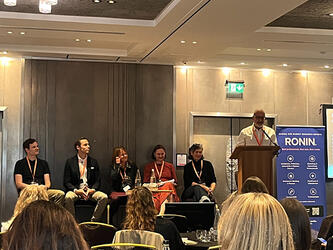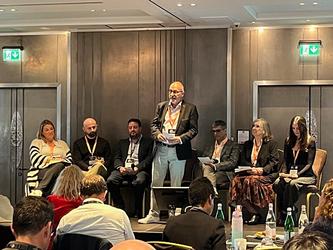Trade-offs and tailored content: Highlights from the MRS B2B research conference

Making the case
Numerous companies are actively promoting their sustainability credentials at the moment, although there is some cynicism among the general public about their commitment to follow through on those espoused principles in practice.
Dominic King, UK research lead at Accenture, discussed some of the implicit biases that exist in how organisations handle sustainability, and said an honest conversation on the trade-offs and perceived trade-offs is needed.
“Companies don’t always do what they say they are going to do. People aren’t stupid – people notice,” King said.
“Why aren’t companies ‘walking the walk’? When push comes to shove, the answer is it is not a priority. For all the soaring rhetoric that sustainability will change the world and is important to our business, it is not a top-tier priority.
“Why is it not a priority? Because there is a perception that if you pursue sustainability, you will dampen profitability – you will lower revenues or increase costs.”
Executives were keen to consider new, sustainable initiatives, but did not want to jettison existing business models overnight, especially due to the funding required, said Thom Noble, president and CSO at CloudArmy Inc, who carried out research into implicit biases. There was, he added, a need to challenge prevailing perspectives of the relationship between profitability and sustainability to help support sustainable practice and environmental, social and governance reforms.
A local angle
Oliver Lewis, chief innovation officer at Convosphere, worked with Coca-Cola on a project to change the company’s B2B social media presence, and found there was a need to tailor content to regional and national markets as well as having a global account. The company’s research of Coca-Cola’s accounts found there was a large proportion of followers of the global Twitter/X account from large nations such as the US, UK and India.
Lewis said there is a need to recognise that different markets have varying requirements, and therefore a more subtle approach is needed to social media content to suit different locations.
“It brings into sharp relief the fact that we need to create regional content and drive regional accounts, rather than rely on global accounts that drown out regional content,” he added.
A dose of reality
The cost-of-living crisis has been arguably most prevalent in the energy sector, where soaring gas prices seriously affected consumers and businesses. British Gas’s business division used vox pops from business owners explaining their experience of energy price rises and the pressures from increased costs to make sure the senior team heard people’s experiences first-hand and in a non-sugar-coated way.
“When your customers are going bust and owing you a lot of money, it rapidly becomes your problem,” said Stuart Hotchkiss, customer research manager at British Gas Business.
“Vox pops made it very real. Sometimes we forget customers are human beings – they are not just account numbers. Showing those videos to the senior leaders in our business made a real difference.”
On the same page
Millennials have, at their upper limit, reached their 40s and are quickly taking over management roles within businesses. A B2B International study sought to understand their requirements from insight and within the workplace, and among the findings was a desire for expertise from insights professionals that they could take back to their business.
Victoria Maxey, senior research director at B2B International, said millennials want to know that information they receive is of a high quality, and that they can therefore safely present the information to their boss.
“It is that feeling of ‘I am going to be incredibly supported by whomever I have hired and they are going to have my back, and they are going to help me and be my partner’,” Maxey said. “The researcher will make sure I take insight back to my business and that I will look like I know what I am talking about.”

We hope you enjoyed this article.
Research Live is published by MRS.
The Market Research Society (MRS) exists to promote and protect the research sector, showcasing how research delivers impact for businesses and government.
Members of MRS enjoy many benefits including tailoured policy guidance, discounts on training and conferences, and access to member-only content.
For example, there's an archive of winning case studies from over a decade of MRS Awards.
Find out more about the benefits of joining MRS here.














0 Comments